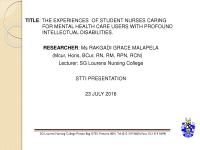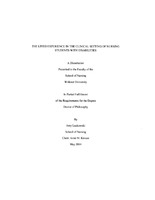| dc.contributor.author | Malapela, Rakgadi Grace | en |
| dc.date.accessioned | 2016-07-13T11:03:44Z | |
| dc.date.available | 2016-07-13T11:03:44Z | |
| dc.date.issued | 2016-07-13 | en |
| dc.date.issued | 2016-07-13 | |
| dc.identifier | INRC16H09 | |
| dc.identifier.uri | http://hdl.handle.net/10755/616073 | |
| dc.description | Theme: Leading Global Research: Advancing Practice, Advocacy, and Policy | en |
| dc.description.abstract | Session presented on Saturday, July 23, 2016: THE EXPERIENCES OF STUDENT NURSES CARING FOR MENTAL HEALTH CARE USERS WITH PROFOUND INTELLECTUAL DISABILITIES Introduction: An estimated one third of the general population suffers from an intellectual disability (ID). Individuals with an ID remain one of the most marginalized groups and they have poorer health care needs than the rest of the population (British Department of Health, 2001 cited in Read & Cartlige, 2012:23). The intellectually disabled is defined as someone whose intellectual function and adaptive behaviour (everyday social and practical skills) differs significantly from what is normative in his or her society (American Association of Intellectual and Developmental Disabilities (AAIDD) 2011, as cited in Aldersey 2012:02). This implies the difficulty that they are exposed to, including difficulties in meeting activities of daily living and inability to work independently. Objectives: To describe the experiences of fourth year nursing students in caring for mental health care users with profound intellectual disabilities. To explore the meaning attached to caring for mental health care users with profound intellectual disabilities. To recommend best practices in caring for mental health care users with profound intellectual disabilities. Methodology: A qualitative descriptive and explorative research method was used, to explore the experiences of students caring for mental health care users with profound intellectual disabilities. Data collection was done using reflective diaries and in depth interviews. Twelve participants aged between 21-50 years participated in the study. Results: Five themes emerged from the study, namely; emotional challenges, communication difficulties, complex nature of intellectual disabilities, burden of care and mixed feelings. Findings of the study shed light on the reasons why students are ill prepared to work at the centres that deal with individuals suffering from profound intellectual disabilities. Recommendations: The care centre should be made more attractive, as a means to stimulate interest and joviality among the clients and nurses alike. More community integration and awareness programmes should be put in place to break silence, stigma and discrimination about intellectual disabilities. A longer duration of placement of students in a unit, for example four weeks, instead of two weeks for placement should be considered. This may assist students in knowing and understanding users, minimise frustrations and promote successful communication. Full time mentors should be made available, for assistance in offering emotional support to students and for ensuring that the centre is conducive for students to achieve their learning outcomes. Service awards should be awarded to staff who have worked at the centre for a period of five years and more, as it is not easy to care for users with profound intellectual disabilities. The staff should be rotated in different wards on a three year basis, to minimise burnout and emotional drainage. Conclusion: The study revealed that completing nurses find working with people with profound intellectual disabilities to be emotionally challenging and that negative experiences outweigh the positive experiences, resulting in their reluctance to want to work with mental health care users with profound intellectual disabilities. Key concepts: Caring, mental health care users and profound intellectual disabilities | en |
| dc.format | Text-based Document | en |
| dc.language.iso | en | en |
| dc.subject | caring | en |
| dc.subject | users | en |
| dc.subject | disabilities | en |
| dc.title | The Experiences of Student Nurses Caring for Mental Health Care Users With Profound Intellectual Diabilities | en |
| dc.title.alternative | Student Experiences in Nursing Education | en |
| dc.rights.holder | <p>
All rights reserved by the author(s) and/or publisher(s) listed in this item record unless relinquished in whole or part by a rights notation or a Creative Commons License present in this item record.
</p><p>
All permission requests should be directed accordingly and not to the Sigma Repository.
</p><p>
All submitting authors or publishers have affirmed that when using material in their work where they do not own copyright, they have obtained permission of the copyright holder prior to submission and the rights holder has been acknowledged as necessary.
</p> | |
| dc.description.note | Items submitted to a conference/event were evaluated/peer-reviewed at the time of abstract submission to the event. No other peer-review was provided prior to submission to the Henderson Repository. | |
| dc.type.category | Full-text | en |
| dc.contributor.department | Non-member | en |
| dc.author.details | Rakgadi Grace Malapela, RN, RM, RPN, RCN | en |
| dc.conference.name | 27th international Nursing Research Congress | en |
| dc.conference.host | Sigma Theta Tau international, the Honor Society of Nursing | en |
| dc.conference.location | Cape Town, South Africa | en |
| dc.date.conferenceyear | 2016 | en_US |
| dc.description.reviewtype | Abstract Review Only: Reviewed by Event Host | en |
| dc.description.acquisition | Proxy-submission | en |





